- Home
- Anthony McGowan
Lark Page 3
Lark Read online
Page 3
“Just. Sheep. Kenny,” I panted.
“Yeah, I knew,” he lied, and we both laughed again.
“Don’t tell anyone we ran from the sheep,” Kenny said.
“Not likely,” I said. “I screamed louder than you did!”
Then we carried on, still heading towards the top of the hill. But my sense of where we were was all messed up somehow, just from that short mad run, along with the diversion down to the gate before it. And the greyness closed in until it felt like the sky was down here, all around us.
And then the snow came again, harder, so you could hear the sound of it tutting as it hit your jacket. We’d got a sweat on from our mad sprint from the gytrash, but that turned to a clammy chill on our backs. The three of us, with Tina back inside my jacket, were soon shivering.
“I h‑hate it here,” Kenny stuttered.
“We’ll soon be out of it,” I said, and I forced myself to grin at him. “Triple chips!”
“Don’t want bloody chips!” Kenny snapped. “Want to go home. Want to go home NOW.”
And then Kenny started running again, not from the gytrash but towards the promise of warmth and safety.
“Hold on, Kenny,” I called out. “Stop it. I can’t … I’ve got Tina!”
I scrambled after him, but it was impossible to keep up. His long legs ate up the ground, and I kept stumbling because I couldn’t put out my hands to balance.
“Wait, Kenny. Wait,” I shouted again, but the snow and the cold grey sky swallowed my voice.
I ran on, ever higher, until my thigh muscles burned with the effort and my breath came in agonised gasps. I stopped and yelled again, or tried to, but I was knackered. All that came out was a croaky wheeze that turned into a hacking cough.
I put Tina down and then collapsed on my knees. I’d got another sweat on from the run, but, like before, the sweat soon turned as cold as death. I knew that Polar explorers fear sweat more than anything. It wets you from the inside out, and then your clothes don’t keep out the cold, and you die. I climbed back to my feet and looked around.
“Kenny!” I screamed as loud as I could. Again, it was as if the sound couldn’t get past the cold air and the blowing snow. It was like I was shouting into a pillow.
I started to panic. What if I couldn’t find Kenny? What if he was lost on this stupid hill, wandering around? I looked at my watch. It was nearly four. It was growing darker all the time. Kenny, alone and lost, in the dark. I screamed again, “Kenny! Kenny!”
“No need to bloody shout.”
It was Kenny. He was just there, right next to me. I grabbed him in a hug that was also meant to be a punishment.
“Kenny,” I said. “If you eff off again like that, I’m having all your chips for the rest of your life.”
Kenny looked down, but I don’t think it was the chips.
“I thought if I started running I’d get there before I stopped. But I ran out of air.”
Even after the hug was finished, we stood close to each other, our arms touching. In our family you don’t say stuff like “I love you”. You show it by standing like this, with your arms touching. Or by sitting together on the couch watching the telly, or by joking with each other while you’re eating your cornflakes. Or by your dad putting his big rough hand in your hair and saying, “Come on, daft lad, let’s get a pizza ordered.” Tina stuck her nose out from my jacket and licked my face and then Kenny’s. The lick was hot then cold, like the sweat on my back.
“Where are we, Nicky?” Kenny asked. “Where are we?”
I didn’t want to say that I had no real idea. I got my phone out. No reception. Not a hint of a bar. Then I tried the printed‑out map, unfolding it with my icy fingers. A few flakes of snow landed on it, and I brushed them away, leaving tracks of ink across the paper.
I saw the path we’d started out on – the path we should have stuck to.
“We’re somewhere here,” I said as I pointed at the blank space between the path and the village. It wasn’t a contour map, where lines show you how steep the land is. There was nothing there. Or almost nothing …
“What’s that?” Kenny said. He put a finger on a line that passed in between where I thought we must be and the top of the hill.
“Er, dunno,” I said. “A path? No, wait, it’s too wiggly. I think it’s a little stream.”
“Will there be fish?”
“Yeah, course. Bound to be.”
Kenny was still pondering. “But it’s in the way,” he said.
“Yeah, but it’s only a stream. We can jump it. And when we get past that, it’ll be downhill all the way.”
“Like Dad?” Kenny asked.
“Eh?”
“When Dad was at school. Them stories … about the beck.”
“Oh, yeah.”
Funny how Kenny had remembered that. There was a beck – a narrow stream – just next to my dad’s old school. Back in the olden days, when there were only three channels on the telly and the internet hadn’t been invented, the best thing they used to do was jumping the beck after school.
I picked up Tina again, and we marched on through the drifting snow.
Nine
We came to the beck maybe fifteen minutes later. I heard it before I saw it. It sounded like a football crowd, or a forest.
“Nearly there, Kenny,” I said.
Kenny looked up and said, “Good” and that was all.
A few seconds later we reached it, and all the hope and excitement drained out of me. It was more like a river than a stream. Three or four metres across.
“I can’t jump that,” Kenny said. “No way.”
I peered at the stream, trying to work out if we could wade across. There were small waterfalls – just a few centimetres high, where the water was white. And brown parts, the colour of tea, where the stream moved slowly.
The trouble was that the slow parts looked quite deep. On a hot day it would have been fun to wade and splash across. But we were already cold to the bone. To be soaked through as well as cold … I crouched and put my fingertips in the water. I thought my hands couldn’t get any colder, but this was a different type of cold. It was a killing cold.
“It’s no use, Kenny,” I said. “We’ll have to go around it.”
I got the map out of my pocket again. It was so creased now that it was hard to read. And more melted snow had got onto it, smearing more of the ink. But I could still just make out the line of the stream. I guessed roughly where we must be, and followed the stream on the map. It went back until it joined the path we’d been on. And it looked like the path went over the stream, so there must be a bridge. I let my finger follow the stream further. Just near the edge of the printed page there was a main road and another, bigger, bridge. Yet here on this hillside, lost in the snow, it felt like we were completely cut off from the rest of the world. It was a bit weird to know there was a proper road out there, cutting into this wilderness.
If we followed the stream back to the path, we’d have wasted an hour of climbing up this bloody hill. But that couldn’t be helped. Jenny used to say that sometimes you mess up. It’s what you do next that counts. There’s no mess so bad that it can’t be cleared up. Something like that, anyway. Sometimes you have to go back so you can go forward.
I tried to show Kenny the way we had to go. But he was dulled by the cold, and his eyes were glazed. He just wanted out. I put my arm around him, but I had to stand on my tiptoes to do it, as he was much taller than me.
“At least it’s downhill,” I said.
“OK.”
“And let’s keep moving. It’s freezing when you stop.”
As we followed the stream, I realised with relief that we were on a sort of track. It wasn’t like the real path, the one we’d left. It was more just that lots of people must have come this way before, so all the feet had made a trail.
For the first time, the walk was almost fun. The stream snaked back and forth as it ran down the side of the hill. There’s somet
hing about walking along by the side of a stream or river that takes away your sadness and eases your fears. Rivers always go somewhere. Rivers never get lost. Follow it, and you’ll be OK.
Kenny’s tread became less tired, and he got a bit more of the old bounce back in his stride. Even the snow seemed to ease off. But then I realised that it was just because we’d turned away from the wind, so the snow blew into our backs rather than our faces. And even the snowy wind at our backs felt like a good thing – a force helping us to get where we wanted. I put Tina down for a minute, but she whined and whimpered till I picked her up and slipped her back inside my jacket.
“Tell us a story,” Kenny said. “Not a scary one.”
I’d always told stories to Kenny. Sometimes I read them from books, sometimes I made them up. I think he liked the ones I made up more than the ones from books, because the made‑up ones often had places and people he knew in them.
“What kind of story, our Kenny?” I asked.
“A good one.”
“Daft lad! All my stories are good.”
“One with adventures in it,” Kenny said.
Adventures. That was tricky. I tried to think of some of the stories I’d read. Old ones, mainly …
“I’m waiting …” Kenny reminded me.
So I told Kenny all the stories I could think of. Stories about the Greeks fighting the Trojans, all because of some girl everyone fancied.
“What was she called, the girl?” Kenny asked.
“Eh, oh, Helen, I think,” I said.
“Helen? That’s not an olden‑days name. There’s a Helen in my class. She’s got metal on her teeth to make them straight. She was kissing a boy in the playground and they got stuck together, because he had metal teeth as well. They had to get the fire brigade to chop them into two again.”
“No way!” I said.
“They did!” Kenny told me. “Well, I wasn’t there, but that’s what I heard. They would have been stuck together for ever. They would have had to get married and live like that.”
“How would they eat if their mouths were stuck together?”
“I don’t know. Doctors would put a pipe in them to pour soup down.”
“A pipe? Where would they put it?” I asked.
“I don’t know. Up the bum probably.”
Kenny said this in a matter‑of‑fact way, but that just made it more funny, and it was ages before I could finish the story, about how the Greeks only won because they hid inside a giant wooden horse, and the Trojans dragged the horse inside the city. And then the Greeks sneaked out in the night and burned the city down. They killed nearly all the Trojans and took back Helen.
“What did they take the horse into their city for?” said Kenny. “That were stupid. They should have looked inside it. They should have set it on fire.”
And I didn’t really have an answer for that.
Next I told Kenny about King Arthur and his knights, and how they spent all their time fighting each other and rescuing ladies from castles. I said how loads of them died looking for some cup full of Jesus’s blood. And at the end there was a great battle, and Arthur’s son was in charge of the baddies, and Arthur killed him but got a mortal wound himself. I told him that Arthur went off to die on an island, but he might not have, and he might be coming back with all his men when we need him most, shining like gold.
Ten
As we’d walked our way through the stories, the landscape changed. It was almost as if the world was changing to fit in with the stories. First a few bushes and tiny tree saplings began to line the banks of the stream. Then the banks on both sides rose up, so that the stream was below us – except it was even more like a river now. Then trees grew around and over us, and that was good because we were more sheltered from the snow and the wind. The trees were mainly bare, but if you looked closely you could see buds beginning to emerge – tight fists of life waiting to open out into a green hand.
Not so good was the fact it was getting dark. We hadn’t seen the sun all day, just rainy greyness turning into snowy greyness. So it wasn’t as if you could see the sun sinking, or even sense it. It was just like one of those dimmer switches, with someone gradually turning the lights down.
“Why aren’t we there yet?” Kenny asked.
“Won’t be long. The river will cross the path in a few minutes, and before you know it, it’ll be chip‑butty time.”
Just then the bank we were on took a turn upwards, and the stream fell even further below. The sound of the water deepened into a roar, and big rocks barged out from the surface. There were no still parts of the river, and everything was white. We walked on. I looked across at the other bank and saw that the stream had carved a canyon, and the walls were shining rock.
The drop down to the water now was almost as tall as the side of a house. It would have been dangerous, but someone had put up a wooden fence to stop you falling over the edge.
The snow had stopped, or rather turned back to wet sleet. And the trees were thicker here, so that there wasn’t much snow lying on the ground. I took Tina out of my jacket and put her down. She looked happy to be among the trees and cocked her leg a few times.
I was suddenly starving. And then I remembered that we didn’t have to find the village to have something to eat.
“Kenny,” I said. “The sarnies!”
“What?” Kenny asked. “Oh yeah! And there’s pop left.”
Kenny was carrying the bag on his back. It had been there in plain sight all along. We stood next to the fence, looking down on the stream. It was frothing and raging below, but it seemed more happy than angry. It reminded me of being at junior school when the bell for the end of the day went. You sprinted out of the school gates, screaming and leaping for joy.
Kenny dug down into the Adidas bag. He’d put the sandwiches back inside the empty bag from the sliced bread and then tied a knot in the neck. He had to take my gloves off to untie it. For a second I thought how nice and snug it must have been for his fingers wrapped up in the warm wool.
“What shall I have first – cheese or jam?” I said. Already my mouth was filling up with saliva.
“Eh?” Kenny asked, as if I’d said something in Chinese.
“Oh, never mind. Just give me whatever comes out.”
Kenny reached down inside the plastic bag and pulled out a sandwich. I grabbed it and took a massive bite.
I nearly puked. I spat out what I’d bitten. Then I grabbed the cola bottle and had a good swig.
“Shit, Kenny, what the bloody hell is that?” I said.
Kenny looked at me, still clearly puzzled. “Sandwich …”
“Yeah, but what …?”
“Cheese and jam,” Kenny told me. “Like you said.”
“You put cheese and jam in the same sandwich?”
“Yeah. You said to.”
“I told you to make cheese sandwiches and jam sandwiches,” I said.
“You said cheese and jam. So that’s what I done.”
Then Kenny took one of the sandwiches and started to eat it. He chewed it slowly for a while, as if he was considering some deep problem about the meaning of life.
“Tastes all right,” Kenny said.
“Nutter,” I said, and I tried not to smile. Then I had another bite of my sandwich.
“I’ve had worse things for dinner,” I said.
I was remembering some of the things that Dad used to try to cook when he was still on the booze and not coping, back in the days before Jenny came and sorted him out. One time one of his mates gave him a pheasant he’d run over in his van. He said that he’d hung the pheasant and that it was ready. My dad had been on a bender for a few days and didn’t know what to do with it. He just put the whole thing in the oven – feet, feathers, guts and all.
It was a beautiful bird, despite being a bit squashed from getting run over by the van. I remembered the shimmering greeny‑blue of its head and the vivid blood‑red of the patch around the yellow eye. Even the golden‑b
rown of its back was beautiful when you looked at it – millions of different shades from yellow to black and everything in between. And then the two long, proud tail feathers, with stripes like a railway line going to heaven. Anyway, Dad put it in the oven and then fell asleep on the couch. Me and Kenny were starving. All we’d had to eat for a few days was toast. Not even toast with butter or marge – just toast.
So me and Kenny waited, somehow thinking it would come out like a roast chicken you’d see on the telly. We probably weren’t seeing things straight because of the hunger. We used to itch a lot, too, back in those days. And I don’t think we smelled that great …
Talking of which, it was the smell that got to us first. It was rank. Mainly the feathers burning, I guess. Mixed in with the bird shit left in the pheasant’s guts, cos it hadn’t been cleaned, like I said … But because we were there all the time and the smell came on gradually, we didn’t really notice it.
We had no idea how long to cook it for. All I can remember is us sitting in the kitchen waiting for it to be ready.
And then there was a muffled bang from the oven, like someone dropping a heavy bag. I opened the oven door and black smoke spilled out. And there was a stench like a tramp had shat himself and then set his underpants on fire.
I turned the oven off, and me and Kenny ran out into the garden before the stink and smoke killed us. Ten minutes later, we came back. My dad was still out of it on the couch, but he mumbled and coughed in his sleep.
I took the pheasant out of the oven. If I hadn’t seen my dad put it in, I’d never have guessed what it was. It looked like some terrible experiment that had gone wrong. Blackened feathers, bits of inside, bits of outside.
“I think it blowed up,” Kenny said.
We had toast again for dinner.
I took another bite of the cheese and jam sandwich Kenny had made. Now I was expecting it, the taste wasn’t so bad. I made myself imagine it was pickle, not jam. Anyway, I was starving hungry and freezing cold, and the sandwich helped.
I stood by the fence and looked down at the gorge. The cliffs on each side, the rocks sticking up from the stream and the rapids made it look like something you’d see on a documentary about the wilds of America or Russia or somewhere. Just a bit smaller. You could almost imagine bears hunting for salmon in the river and wolves prowling among the trees.

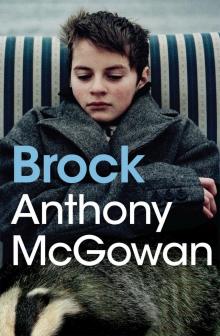 Brock
Brock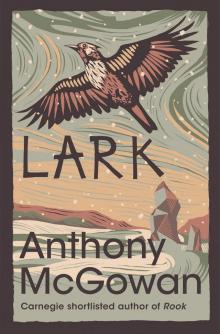 Lark
Lark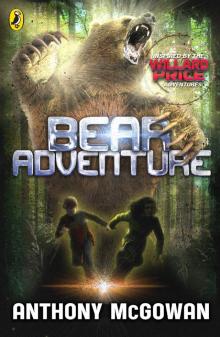 Bear Adventure
Bear Adventure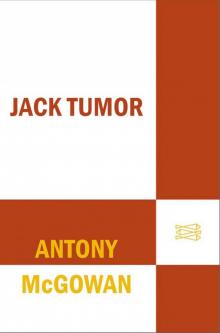 Jack Tumor
Jack Tumor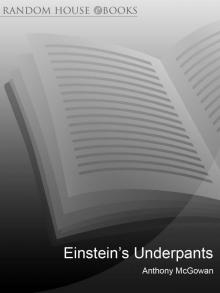 Einstein's Underpants--And How They Saved the World
Einstein's Underpants--And How They Saved the World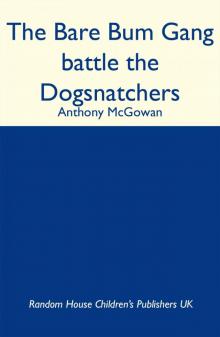 The Bare Bum Gang Battles the Dogsnatchers
The Bare Bum Gang Battles the Dogsnatchers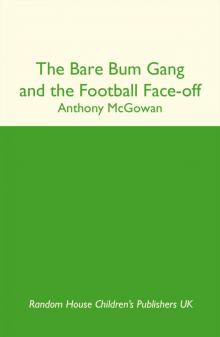 The Bare Bum Gang and the Football Face-Off
The Bare Bum Gang and the Football Face-Off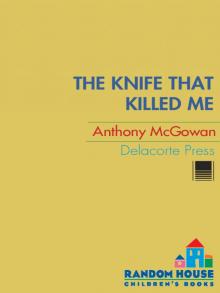 The Knife That Killed Me
The Knife That Killed Me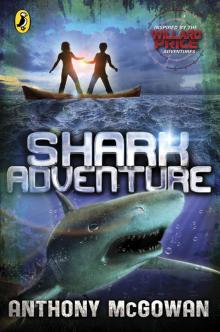 Shark Adventure
Shark Adventure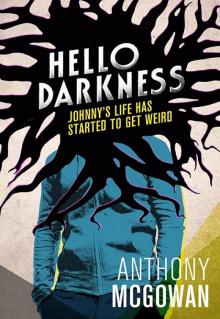 Hello Darkness
Hello Darkness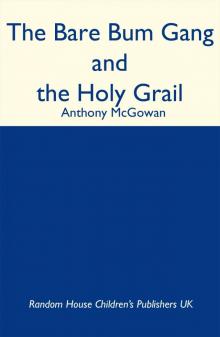 The Bare Bum Gang and the Holy Grail
The Bare Bum Gang and the Holy Grail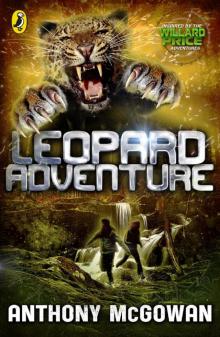 Leopard Adventure
Leopard Adventure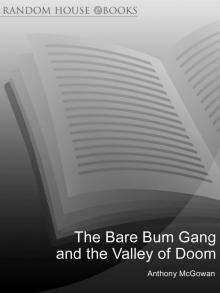 The Bare Bum Gang and the Valley of Doom
The Bare Bum Gang and the Valley of Doom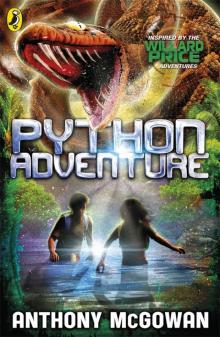 Python Adventure
Python Adventure